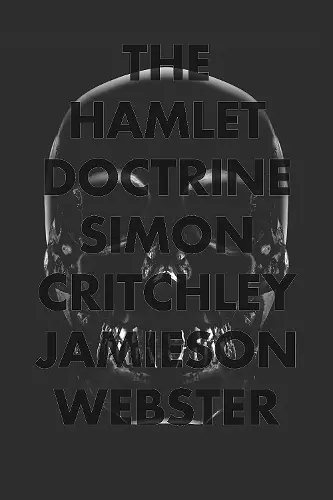The Hamlet Doctrine
Knowing Too Much, Doing Nothing
Simon Critchley author Jamieson Webster author
Format:Hardback
Publisher:Verso Books
Published:10th Sep '13
Currently unavailable, our supplier has not provided us a restock date

"A serious provocation to both the biscuit-box Shakespeare industry and, more widely, to contemporary literary culture." - Independent
Arguably, no literary work is more familiar to us than Shakespeare's most famous tragedy. Everyone can quote at least six words from the play; often people know many more.
In this riveting and thought-provoking re-examination, philosopher Simon Critchley and psychoanalyst Jamieson Webster explore Hamlet's continued relevance for a modern world no less troubled by existential anxieties than Elizabethan London.
Reading the drama alongside writers, philosophers and psychoanalysts-Schmitt, Benjamin, Freud, Lacan, Nietzsche, Melville, and Joyce-the authors delve into the politics of the era, the play's relationship to religion, the exigencies of desire and the incapacity to love. It is an intellectual investigation that leads to a startling conclusion: Hamlet is a play about nothing in which Ophelia emerges as the true hero.
From the illusion of theatre and the spectacle of statecraft to the psychological theatre of inhibition and emotion, what Hamlet makes manifest is the modern paradox of our lives: where we know, we cannot act.
The Hamlet Doctrine is a passionate encounter with a great work of literature that continues to speak to us across centuries.
This is an engaging, eloquent, and insistently pleasurable text that makes the best case possible for "rash" reading. Hamlet can now be read in light of a number of new theoretical vocabularies such that we cannot think about love, self-reflection, doubt, or obstinacy without being haunted by its ghost. This collaborative writing gives us a dynamic set of forays, recruiting us into the start and stop of thought, making Hamlet crucial for the thinking of our own impasses and delights. In the mix is a singular and illuminating encounter between philosophy and psychoanalysis. -- Judith Butler, author of Frames of War
Critchley and Webster's fierce, witty exploration of Hamlet makes most other writing about Shakespeare seem simpleminded. -- Hari Kunzru, author of Gods Without Men
I found myself ravenously turning pages. I absolutely love the book, which I think is brilliant both as a set of readings of the play and as a meditation on contemporary, postillusion existence. Hamlet is, as everyone knows, about everything , but it's also about nothing , or rather, nothingness. And this almost impossibly aphoristic book penetrates to the center of this paradox. A thrilling performance. -- David Shields, author of Reality Hunger
The gap between thought and action has rarely been contemplated with so much intellectual excitement and energy as it is in this book. Indeed, this study of Hamlet is a kind of thrill ride, a breathless investigation of some of the most important ideas from philosophy and psychoanalysis from the Modern era. But the great pleasure it holds in store for most readers has to do with its profound understanding of reflection, and its discontents. -- Charles Baxter, author of The Feast of Love
A brilliant set of readings of a work that, like an insistent ghost, seems to have more to tell us with each passing era. -- Tom McCarthy, author of C
In their provocative new study, Simon Critchley, a professor of philosophy at the New School, and Jamieson Webster, a practicing psychoanalyst and author, offer a novel take on this most commented-upon of dramas. It is as much an astute account of the reactions of various philosophers and psychoanalysts to the play-and their often profound and sometimes wacky analyses-as a chronicle of the authors' own passionate response to virtually every aspect of the tragedy. The authors have an impressive mastery of all the factual details of the play . . . their discussions of such thinkers as Hegel and Nietzsche or Freud and Lacan are at once pithy and perceptive. * Wall Street Journal *
ISBN: 9781781682562
Dimensions: unknown
Weight: 467g
320 pages